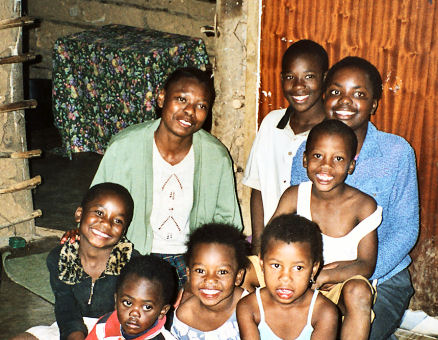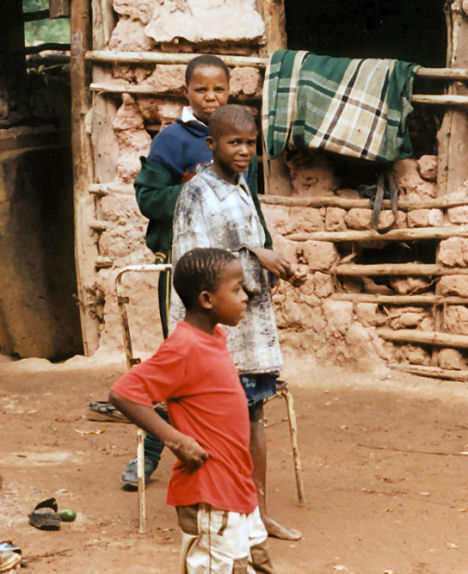SOS Family Strengthening Programme, Mbabane and Nhlangano, Swaziland
18/10/2007

There are many facets of the Family Strengthening Programme (FSP), which are all interlinked. These facets include nutrition; income generation projects; healthcare; counselling; scholarship programmes; and ‘care points’ (food distribution points).
In total, 1,363 people benefit from the FSP; of these, 1,165 are children and 198 are adults (parents, grandmothers or other carers).
Nutrition
200 families in 7 districts of Mbabane, Swaziland’s capital, and Nhlangano, in the south, received food parcels in 2006. These parcels consisted of: beans, peanut butter and soya mince (all high in protein); cooking oil; maize meal (the staple food, high in carbohydrates); candles and matches. Food parcels are particularly important for child-headed families as they have no income to purchase their own, nutritious food.
Income generation
Important as the food parcels are, particularly for growing children, we do not want the families to become dependent on them. We teach these families how to grow vegetables and raise animals; some of this home-grown food is eaten by the family, and the rest is sold at the local market for profit. The Ministry of Agriculture is supporting this project, and is training the guardians in basic business skills so they are more aware of the opportunities in the local market.
Some of the families are finding it difficult to keep their gardens going; however, all the gardens are still producing vegetables, and families who are struggling are given extra support.
Independence from sponsorship

Important as the food parcels are, particularly for growing children, we do not want the families to become dependent on them. We teach these families how to grow vegetables and raise animals; some of this home-grown food is eaten by the family, and the rest is sold at the local market for profit. The Ministry of Agriculture is supporting this project, and is training the guardians in basic business skills so they are more aware of the opportunities in the local market.
Some of the families are finding it difficult to keep their gardens going; however, all the gardens are still producing vegetables, and families who are struggling are given extra support.
Healthcare
SOS nurses currently visit 23 families with chronically ill members; approximately 40% of adults in the 7 districts we work in are HIV positive. (With a life expectancy of 30, it is not surprising that 18% of children in Swaziland have lost one or both parents, over two-thirds of these to AIDS).
A small SOS healthcentre has been set up for the children to attend when necessary. When parents are ill, however, they often cannot take sick children to the clinic, leading to complications. Parents are urged to contact the SOS community nurses in this situation, who will take the children to the clinic.
Counselling
In conjunction with the Salvation Army in Swaziland, we help the children on the FSP come to terms with the loss of their parent(s). Through role playing, drawing and therapeutic exercise, for example, the children learn skills to help them deal with their trauma and cope with the challenges they face in their everyday lives.
A lot of child-to-child sessions are run, where the children share their thoughts and feelings with peers, who are also experiencing the same difficulties. Through these sessions, the children have made friends with each other, which is a great outcome.
Carers with or affected by HIV/AIDS are also offered professional counselling. Beneficiaries of these counselling sessions have set up two support groups, and their weekly meetings are guided by SOS social workers.
Scholarship and literacy programme
1,041 children from the FSP and the local community attend literacy classes. These are intended for children who have never been to school or who have needed to drop out early as parents couldn’t afford the fees. Through the classes, the children gain confidence and, once they have improved to the necessary standard, they return to school. Some of the children may be older than normal in a particular class - for example, it is common to see 17-year-olds in Year 8 classes - but this is never a problem. SOS Children pays the children’s school fees until their parents/guardians are able to afford these fees themselves.
One challenge that has arisen is that the parents/guardians become too dependent on this scholarship progrmmae, which means they don’t see the need to support their children themselves. However, we are working hard to rectify this issue by placing a greater emphasis on the income generation projects.
A sponsored child's view
This child is 18 years old and is the eldest of five siblings. His father died when he was nine years old and he had to drop out of Year 4 because there was no money for school fees. His mother is unemployed and terminally ill. He joined the SOS Literacy Class when he was 13 years old and thrived. In 2005, he sat the Primary School Year 7 external examinations and passed with First Class.
"I go to school at SOS School. I'm doing Year 8. I live with my mother. My father died in 1996. I first went to the Literacy Class, then I went to Impumelelo Primary School. I like school very much such that even now in my class no one is able to reach my pace. I study hard so that I can have a more secure future. When I finish school I would like to be an accountant. The money I earn will help those who are in need. I'm from a single parent family where my mother earns R300 (£21) per month to feed four children."
*Real name has been witheld online to protect privacy
Relevant Countries: Swaziland.